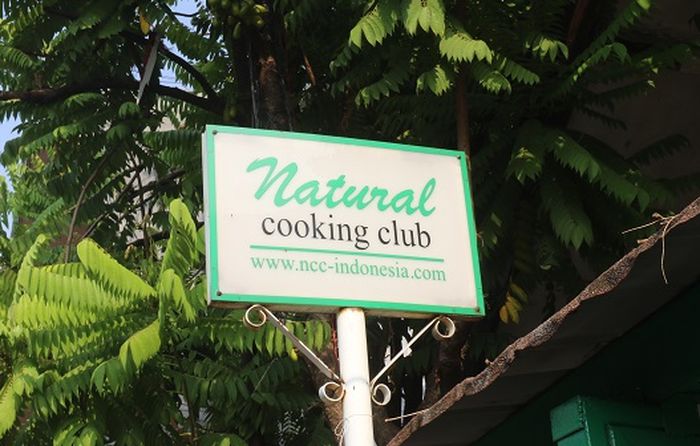
Kitchenesia.com - Having an interview with Fatmah Bahlawan was a pleasant experience.
It's like talking to that one mom everyone has: busy making sure the food is good and enough to feed a pack of hungry boys while at the same time doing thousands of other house chores.
And yet you are always sure that she is the mom you can always ask about a few more thousands questions about your life's choices or your bad exams.
Fifty-five-year-old Fatmah Bahlawan was born in a big family, a daughter among 14 children.
In charge as a cook in a full house, she learned a lot about food-making processes from her mother.
Growing up, as a mother of two, she worked as a secretary in a government-owned bank, making her leave her cooking passion almost completely.
When Indonesia suffered from financial crisis in 1998, she never imagined that the crisis would affect her family so bad, to the point she needed to make a hard life decision: live frugally or make extra money.
Each choice had sacrifices to bear.
Her choice in starting culinary business came with big responsibility: she did everything on the evening after finishing her 9-to-5 job.
However, she admitted that never encountered great difficulties.
“It was exhausting," she admitted.
"But God made my path smooth,” said Fatma at her house in Manggarai district, South Jakarta.
In the early 2000s, after selling thousands of sponge cakes, she thought that it was time to give back.
She felt she should share her skills to those needed, especially the housewives still financially dependent on their husbands.
She founded “Private Class with Ibu Fatma”, a one-student-one-teacher cooking class that she and his husband started in January 2005.
Private Class with Ibu Fatma has transformed into Natural Cooking Club (NCC), a non-profit community on the ideals of solidarity to teach housewives to “make money from your own kitchen”.
Initially, NCC had only 5 members when it first started.
As years gone by, there are over 130.000 members in its Facebook group, as well as 37 thousand followers on the Instagram.
Empowering thousands of women financially, Fatma who is now completely dedicating her time in teaching, met Kitchenesia.com in an exclusive interview.
What really makes one a foodpreneur?
Everyone who makes money out of food is foodpreneur.
It is not only about producing food, but selling someone else’s food also can considered as one.
Even in today's era, people can make money out of food, without making or selling them. Just like what food bloggers or food critics do.
That’s why in NCC, we encompass an end-to-end food business flow: from financial management in food-cost class; food producing in cooking and baking class; And even food photography and food blogging.
What is the best food to sell by beginner foodpreneur?
Definitely small-sized food that can be eaten anytime. Cakes.
In NCC, baking and cake decorating classes are the most anticipated ones.
Then savory snack like shumay (chinese dumpling), mpek-mpek (Palembangnese fishcake), and meatballs.
They can be eaten anytime, easy to cook, and everybody likes it.
Small-sized delicacies like bakso and mpek-mpek are already mass-produced by food factories. Then, foodpreneur can sell. Do you think system like this is better? Or do you think self-made is better?
Massive food factories won’t disturb homemade business by any means.
Instead, they can be a good help for some foodpreneurs that want to cut food-making time.
There’s nothing wrong with that.
However, I believe customers also have concerns about the origin of food they eat.
That’s why, I prefer homemade to factory-made because foodpreneur can control the ingredients if they cook their own food.

How about selling food to people overseas? Do you think it’s best to sell traditional food from Indonesia based on their tastes, even though it reduces the original flavor? Or being faithful to the original flavor while ignoring the market’s tastes?
We need to research the market before starting business.
Also, I don’t think people from overseas don’t like the original taste of Indonesian food.
For example, for Europeans, we can sell some Indonesia’s sweet delicacy such as klepon cake or thousand-layer cake.
For Mexicans and Asians who love spicy food, Sumatran and Manadonese cuisines might be best to them.
Don’t sell food that the market don’t like.
What do you think about the trend of traditional-international food hybrid? For example pizza with rendang topping. Do you think it will make traditional food marginalized? Or otherwise?
If customers like it, why not?
I think such innovation gives positive impact to local foodpreneurship.
We have rendang pizza (Italian pizza with Padangnese rendang topping), gulai croquette (French fried breadcrumbed snack with Indonesia curry fillings), and even cheese cireng (Sundanese fried snack with cheese fillings).
Indonesians have such open-minded tongues (laugh).
Any tips for beginner foodpreneurs?
Your first customers are most likely your friends.
Build an intimate relationship with customers.
If you have time, meet them.
Focus on building business started by what you have, not otherwise.






